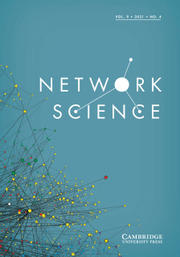Crossref Citations
This article has been cited by the following publications. This list is generated based on data provided by Crossref.
Feri, Francesco
and
Pin, Paolo
2014.
The Effect of Externalities Aggregation on Network Games Outcomes.
SSRN Electronic Journal,
Jackson, Matthew O.
Rogers, Brian W.
and
Zenou, Yves
2015.
The Economic Consequences of Social Network Structure.
SSRN Electronic Journal,
Tabasso, Nicole
2015.
Diffusion of Multiple Information: On Information Resilience and the Power of Segregation.
SSRN Electronic Journal,
Jackson, Matthew O.
Rogers, Brian W.
and
Zenou, Yves
2017.
The Economic Consequences of Social-Network Structure.
Journal of Economic Literature,
Vol. 55,
Issue. 1,
p.
49.
Tabasso, Nicole
2019.
Diffusion of multiple information: On information resilience and the power of segregation.
Games and Economic Behavior,
Vol. 118,
Issue. ,
p.
219.
Feri, Francesco
and
Pin, Paolo
2020.
EXTERNALITIES AGGREGATION IN NETWORK GAMES.
International Economic Review,
Vol. 61,
Issue. 4,
p.
1635.
Muscillo, Alessio
Pin, Paolo
and
Razzolini, Tiziano
2021.
Spreading of an infectious disease between different locations.
Journal of Economic Behavior & Organization,
Vol. 183,
Issue. ,
p.
508.
Chang, Myong-Hun
and
Tassier, Troy
2021.
Spatially Heterogeneous Vaccine Coverage and Externalities in a Computational Model of Epidemics.
Computational Economics,
Vol. 58,
Issue. 1,
p.
27.


